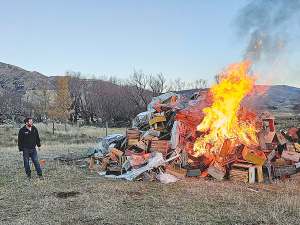Naki unveils the world’s most expensive manuka honey
Naki Honey, a New Zealand manuka apiary company, has crafted what is believed to be the world's most expensive honey.
 North Canterbury beekeeper Steven Brown burns hives and equipment under an order to control a find of American Foul Brood disease.
North Canterbury beekeeper Steven Brown burns hives and equipment under an order to control a find of American Foul Brood disease.
The agency charged with controlling the serious bee disease American Foul Brood (AFB) has defended itself against criticism from a North Canterbury beekeeper who was recently ordered to destroy equipment following a find of AFB spores in his storage shed.
Steven Brown of Springbank Honey, near Cust, received wide publicity through mainstream and social media with stills and video of him and his family burning about 10,000 empty bee boxes and equipment, which he said was valued at $2 million.
He had been ordered to destroy equipment following the detection of AFB spores on a small number of used bee boxes.
Brown has made several complaints about the process, including that he was told to destroy brand-new still-wrapped boxes, that the finds were minor and would not necessarily lead to hive infection, that the testing and inspection was carried out by other local beekeepers with potential conflicts of interest, and that no compensation was available.
“We are still fighting though the courts and local government to get remedies for what they did to us, and help other beekeepers going through the same process,” Brown said in a recent Facebook video.
In response to the publicity, the management agency for the National American Foulbrood Pest Management Plan has taken the unusual step of distributing a statement to all beekeepers, laying out its reasons for its actions.
Agency manager Niha Long said she was heartened by support from the sector, and the agency “remained committed to supporting New Zealand beekeepers in their fight against AFB”.
“Following best practices when managing AFB is vital to the sector’s success on several fronts. For one, ensuring that New Zealand’s bee products meet export market requirements.
“Unfortunately, some details were reported incorrectly in recent media coverage.”
Long told Rural News the plan puts the responsibility for AFB management with the beekeepers themselves, who must destroy all infected bees and hives and report the instance within seven days.
“Burning is normal because the spores cannot be destroyed in any other manner, unfortunately.”
Long said she could not speak about a specific business, but the agency’s statement emphasised a process in which it would not intervene as long as a beekeeper followed the correct steps and regularly implemented best practice.
Marco Gonzalez, the agency’s southern region national operations manager, has confirmed that attention turned towards Springbank Honey in March following another beekeeper reporting an outbreak on some of his hives in the Lees Valley, with Springbank Honey hives nearby.
The agency’s statement said that when an outbreak of AFB is reported, surveillance is stepped up of registered hives in that vicinity.
“These may be the hives of the reporting beekeeper or could be apiaries owned by other beekeepers situated in a 2km radius.
“Our operations managers refer to the AFB history and past compliance record of every beekeeper in that region.
“Once a source is known or suspected, apiary inspectors (AP2s) may be deployed to inspect all apiaries, monitor any unregistered or abandoned sites, and take swab samples for testing.”
Brown said the inspectors who came to his base at Cust included a woman from a family with competing beekeeping interests in the district, who he accused of spitting at him and making unreasonable demands of his staff for access to his sheds at a time when he had yet to start work for the day.
Gonzalez said that, like all farmers, all beekeepers were “low-level competitors” with each other, but the inspection system had to depend on certified beekeepers who knew what to look for. They had to declare no conflict of interest with the operation they were inspecting.
The formal Notice of Direction, which Brown has supplied to Rural News, ordered him to destroy used equipment housed in the two bays of his storage shed where spores were detected by swabbing. The NoD has no mention of new equipment but Brown told Rural News that he was verbally told by Gonzales to destroy the new boxes as well.
Gonzalez denies that, saying “there is no way we would order anyone to burn new. That doesn’t make sense”.
The World Wide Sires National All Day Breeds Best Youth Camp Best All Rounder plaudit has become family affair, with 2026 Paramount Cup winner Holly Williams following in her sister Zara's footsteps.
DairyNZ is giving New Zealand farmers a unique opportunity to gain hands-on governance and leadership experience within the dairy sector.
Herd improvement company LIC has posted a 5.2% lift in half-year revenue, thanks to increasing demand for genetics.
According to the latest Fresh Produce Trend Report from United Fresh, 2026 will be a year where fruit and vegetables are shaped by cost pressures, rapid digital adoption, and a renewed focus on wellbeing at home.
The Roar is a highlight of the game hunting calendar in New Zealand, with thousands of hunters set to head for the hills to hunt male stags during March and April.
OPINION: The past few weeks have been tough on farms across the North Island: floods and storms have caused damage and disruption to families and businesses.

OPINION: Meanwhile, red blooded Northland politician Matua Shane Jones has provided one of the most telling quotes of the year…
OPINION: This old mutt has been around for a few years now and it seems these ‘once in 100-year’ weather…